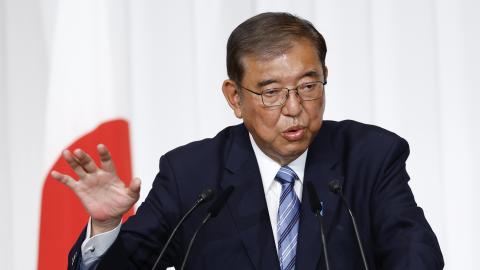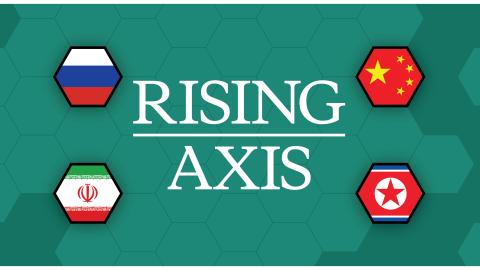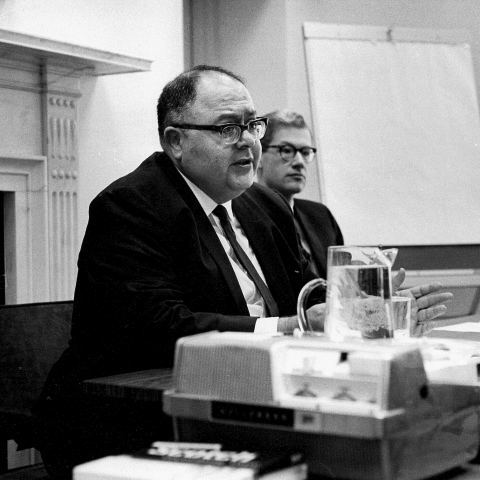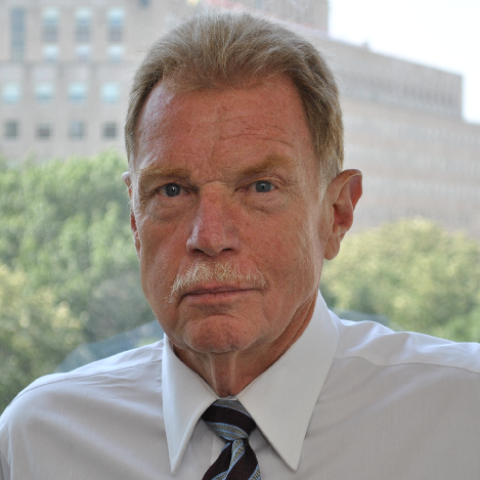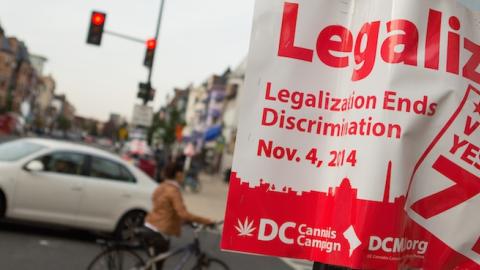Last March, in an interview with Vice News, President Obama said he was “encouraged” regarding efforts at the state level to allow greater access to marijuana, currently a Schedule I controlled substance under the federal Controlled Substances Act (CSA), defined by a serious potential for abuse without any legitimate, proven use in medicine.
As President, his “encouragement” has considerable force, and has become in several states de facto legalization by federal neglect. The President also noted that “legalization ... is not a panacea.” Actually, the President’s policies have created broad areas of legal confusion and contradiction.
Defenders of legal marijuana often claim that drug use is personal, and that the user “harms no one but himself.” This is simply untrue, as is apparent once we grasp the actual damage drug use does to the user’s family, workplace, community, and even the security of the nation.
The corollary is that a failure to enforce the laws against drug use likewise cascades into areas well beyond the immediate user and dealer. Provisions regarding drug use and trafficking are embedded within multiple areas of the law, and affect public health, public safety, and even the integrity of public institutions, well beyond the particular facts of a drug case.
One cannot simply dismantle drug laws without extensive effects throughout the wider legal system.
Marijuana legalization does not represent “federalism” but rather is another example of unilateral executive action. The Obama Administration suppressed legal restraints—the President did not work to change the law, he simply started ignoring the law, but that required him subsequently to ignore law and then another, and then another. The dismantling began with the guidance from the Department of Justice (DOJ) enabling legal marijuana production and sale at the state level by restricting enforcement of the federal CSA
Clearly, federal authorities did not think through this action, and as recreational marijuana has unfolded, the legal landscape surrounding marijuana production, sales, and use has become a jumble of ad hoc guidance, as shifts in one area of the law create problems in adjacent areas. The Obama Administration began making it up as they went along.
In October 2009, Deputy Attorney General David W. Ogden issued a memorandum intended to provide “clarification and guidance” to federal prosecutors in states that had authorized the “medical use of marijuana.” In the memo, Ogden writes (in short):
* “The Department of Justice is committed to enforcement of the Controlled Substances Act in all states.”
* “Congress has determined that marijuana is a dangerous drug, and the illegal distribution and sale of marijuana is a serious crime...”
* “United States Attorneys are vested with ‘plenary authority with regard to federal criminal matters’ within their districts.”
* Federal resources should not be focused on “individuals whose actions are in clear and unambiguous compliance with existing state laws providing for the medical use of marijuana.”
* “Of course, no State can authorize violations of federal law…”
Taken together, it appears states can authorize and US attorneys should overlook violations of federal law when states have defined certain marijuana use under “recommendation” to be “medicinal.” The key principal, at this time, was whether the state marijuana regimes operated “in clear and unambiguous compliance with existing state laws providing for the medical use of marijuana.”
Ogden also wrote, “[P]rosecution of commercial enterprises that unlawfully market and sell marijuana for profit continues to be an enforcement priority of the Department.” But when state laws then expanded beyond “medical” marijuana to embrace “recreational” cultivation, sale, and use, DOJ again expanded federal prosecutorial discretion, deciding not to enforce federal law accordingly.
Faced with new circumstances of expanded marijuana markets, (a new) Deputy Attorney General James M. Cole issued a different memorandum in June 2011, saying it was never the Department’s intention to shield from federal enforcement “planned facilities” that “have revenue projections of millions of dollars based on the planned cultivation of tens of thousands of cannabis plants.” But he did just that when he issued yet another memorandum, this time in August 2013, explaining why marijuana retailers in certain states would be not subject to federal prosecution. In this case, the “traditional joint federal-state approach to narcotics enforcement,” which was being superseded by the “expectation that states and local governments that have enacted laws authorizing marijuana-related conduct” will create “strong and effective regulatory and enforcement systems” to address public safety concerns.
Notwithstanding the fact that the Supreme Court has found for the supremacy of the federal law (in the case of Gonzales v. Raich in 2005), the Obama Administration has declined to pursue federal preemption over various state marijuana initiatives.
In a major new development, the states adjacent to Colorado will now sue, arguing that Colorado has “created a dangerous gap” in the federal drug-control system, where, the suit claims, “Marijuana flows from this gap into neighboring states.” Notwithstanding evidence that its own legal “red lines” regarding interstate movement of marijuana have been crossed, there has been no federal enforcement action.
These many legal dodges also impinge on areas of federal enforcement not specifically concerned with marijuana and the CSA. First, there is the question of federal income taxes on profits. While state courts have upheld the state tax on marijuana sales, to pay the federal tax constitutes self-incrimination, as the underlying activity remains a violation of federal law. As expected, complications and lawsuits abound, but it’s safe to assume that federal taxes on marijuana profits (in the millions) are not being forwarded to the IRS.
There are other contradictions that are internal to the state statutes themselves. Colorado has a series of statutes regarding child neglect or endangerment. For example, child abuse or neglect under Colorado law explicitly includes situations where “a controlled substance…is manufactured or attempted to be manufactured” in the presence of a child. (C.R.S. 19-1-103 (VI)). Controlled substances as defined by Colorado statutory law include marijuana.
Have such statutes in Colorado simply been set aside, if for no greater reason than that they conflict with intentions to have legal marijuana? Further, compliance with state law was a condition for shielding marijuana activities from federal prosecution, yet here we see a state statute with which Colorado marijuana activities do not seem in compliance.
Moreover, what of the Food and Drug Administration’s authorities? Roughly half of the revenue from sales of marijuana in Colorado is said to be derived from the sale of “edibles,” which are marijuana-laced cookies, brownies, candies, and drinks, advertised for their content of THC, the active psychotropic ingredient in smoked marijuana (and adjudged to be a neurotoxin by numerous brain researchers).
Various federal and state level safe food acts (such as the 1906 Pure Food and Drug Act) prohibit the adulteration of foodstuffs by non-food substances, much less allowing the sale of comestibles containing a potential neurotoxic poison. Penalties for violation can be severe, including seizure, fine and imprisonment.
Yet when Colorado’s health department, fearful for the well being of children sickened by marijuana-laced treats sought to have most of them banned, the marijuana industries’ clout turned them back, even though the Commission noted a “definite risk to children.” Again, in pursuit of the Administration’s political objective, it appears that multiple legal protections are suspended.
In a further development, the state of Washington has now opened marijuana commercial sales operated by government employees under the auspices of a “public-development authority.” The implication is that government employees are now required to perform duties that stand in violation of federal law. Even if these state employees are not prosecuted today, the law has not changed and they could be prosecuted in the future.
Other potential jeopardies include violations of the federal 1988 Drug-Free Workplace Act, whereby those receiving federal contracts or grants in excess of $100,000, including defense contractors and universities, must have a policy prohibiting the unlawful manufacture, distribution, dispensation, possession, or use of a controlled substance in the workplace. Violations of the act can lead to suspension of the contract or grant.
The same Administration narrative of nullification affects the banking and finance industry concerning financial crimes for which marijuana-related conduct is the predicate. Once again we are told in a memo from the same DAG James M. Cole that “limited investigative and prosecutorial resources” make laws regarding money-laundering, the Bank Secrecy Act, and unlicensed money remitters—favorite sites of transnational criminal organizations—low prosecutorial priorities unless they flagrantly violate the Department’s eight enforcement priorities. Hence, if a marijuana business does not implicate the specific priorities enumerated in the memo, “prosecution for these offenses may not be appropriate.”
On the same day, the Department of the Treasury issued concurrent “guidance” from their Financial Crimes Enforcement Network (FinCEN), in order to help financial institutions “provide services” to marijuana-related businesses.
These financial institutions are asked, by the FinCEN memo, to file “suspicious activity reports (‘SARs’),” to prove their anti-money laundering compliance through various statuses that note the degree to which their clients are breaking the law. The effect is to make the financial institution itself responsible for “vetting” their potential customers regarding possible criminal conduct as enumerated in the prosecutorial priorities, a responsibility that many banks have declined to accept.
Law enforcement in Colorado reports that this twisting of law to serve marijuana legalization may be aiding criminal networks in funneling their drug proceeds through exempt marijuana businesses, where literally millions of dollars of cash, from whatever source, may be mixed in with payments for “legal” drugs.
We are not witnessing here “laboratories of democracy” where state laws find legitimate scope of action in the presence of overarching federal statutes. Rather than a healthy exercise in federalism, the Obama Administration is picking and choosing which laws they will embrace or nullify in accord with their political objectives. In short, states cannot know what their law is until this Administration defines it for them in an ad hoc manner.
What we see is that the Administration issues memoranda, often justified under an expansive use of “prosecutorial discretion,” the effect of which is to change, annul, or re-define the scope of laws passed either by Congress or by the states.
The nullification is sufficiently broad that it can be seen to entangle international treaty requirements. When the International Narcotics Control Board (INCB), a United Nations entity charged with overseeing international treaties regarding illegal drugs (to which the US is a signatory) assessed that US marijuana policy was in clear violation of international law, the Administration claimed (see, for example, the remarks of Assistant Secretary of State William Brownfield in this Brookings report that the federal law remains intact—just not enforced.
It takes a certain audacity to persevere in that claim, and the INCB has declined to play the fool. The Board has warned that the US has apparently abandoned its treaty obligations, while our essential international partners in drug control, such as Colombia and Mexico, are withdrawing their commitment in the absence of US leadership. Then-President of Mexico Felipe Calderon indicated as much when he blasted the US for losing its “moral authority” over drug control policy by allowing the state-level actions.
In pursuit of a political objective, the Obama Administration has done damage to areas of enforcement such as criminal drug trafficking, the integrity of financial institutions, and the rule of law. In exchange, we have “legal” marijuana, with its known dangers, including threats to public health, damaged lives for users, increased need for drug treatment, and as Colorado has proven, the continued operation of a criminal black market.
The toll of all this lawless action is high and increasing:
* Political mobilization by legalization interests now press Congress to defund enforcement agencies and amend the marijuana provisions of the Controlled Substances Act, without regard to the known medical harms.
* Effective and necessary law enforcement and border control programs are being weakened or disabled, empowering criminal organizations and a continued black market, with striking increases in interstate smuggling of high potency marijuana.
* Banking and financial services institutions are rendered more vulnerable to manipulation by criminal entities, at the same time that substantial funding from “legalized” drug businesses is threatening the integrity of the regulatory and political process itself, as the newly-immunized operations seek to insulate themselves from accountability.
* Medical science is being subordinated to non-medical imperatives, using political pressure to establish marijuana as a medicine in the absence of compelling data from clinical trials and undermining the integrity of the drug approval process.
* Patients are put at risk when unproven claims drive decisions at public health agencies, such as found at the Department of Veterans Affairs.
* Finally, youth in particular are put at risk from widespread diversion of marijuana products from regulated state agencies overseeing both medical and recreational marijuana markets, affecting school performance, child safety, and public health.
All these dangers arise from violations of current federal law and an assault on the rule of law itself. They also constitute an inexcusable threat to the well-being of American families.
The relevant oversight committees in Congress might ask the Department of Justice, the Department of the Treasury, the Department of State, and the Food and Drug Administration what they already know about the damage that has been caused and how rapidly it is growing.


